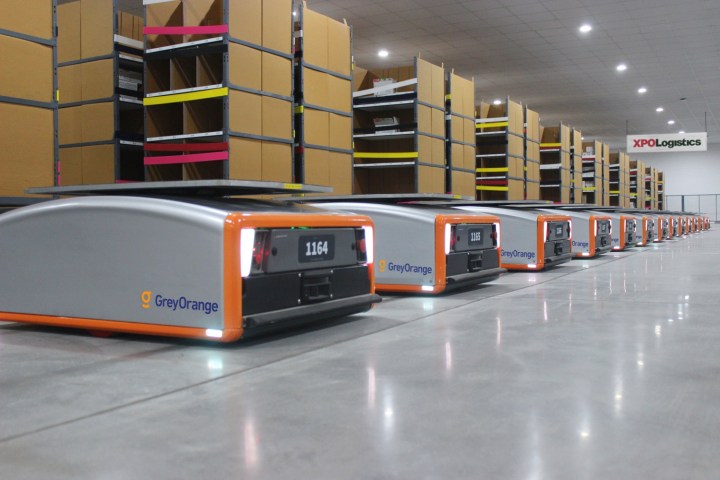
Logistics service provider XPO announced it will add 5,000 robots to its warehouses in the United States and Europe, working as “collaborators” with human employees. The tech-focused company said the robots “will make our logistics operations safe and more productive in picking, packing, and sortation,” according to CEO Bradley Jacobs.
The robots will become part of an existing highly automated system that consists of mobile storage racks and fulfillment stations. One robot is capable of moving a rack that weighs approximately 1,000 to 3,500 pounds to a station where workers can then fulfill orders — up to 48 at one time — XPO says. This workflow allows the company to shorten order-to-shipment times of same-day and next-day deliveries, while minimizing worker walk-times and errors. For customers, it means XPO can deliver goods much faster, without straining its human workforce.
“We’re making maximum use of intelligent automation to support our people,” Jacobs told Digital Trends in an email. “These robots reduce walk time by nearly 80 percent and eliminate almost all heavy lifting. This helps with employee recruitment and retention.”
The robots, built by GreyOrange, a company specializing in warehouse robotics, are designed to support future growth. When we asked if growth means a reduction in human labor, thanks to its new robot workforce, XPO told us its headcount will actually increase.
“Our retail volumes are up 20 percent year-to-date on a year-over-year basis, and it’s not even peak season yet,” according to the company in a statement provided to Digital Trends. “We recently announced plans to hire 8,000 seasonal workers for peak this year. This is up 33 percent from the 6,000 seasonal workers we hired at this time last year.”
XPO has been piloting the robots in one of its facilities and will roll them out through the rest of 2018 and 2019, according to the company.
XPO, which specializes in last-mile deliveries, has been investing heavily in new technologies for its operations, including big data, artificial intelligence, and autonomous vehicles. Earlier this year, it announced voice-enabled delivery tracking via Amazon Alexa and Google Assistant. And in June, XPO unveiled plans for a high-tech, fully automated warehouse for client Nestlé. As more of us are now shopping online and expecting fast deliveries, logistics operators, like XPO and Amazon, are increasingly depending on tech and automation.
This article was updated on October 5, 2018 to include information on deployment timeline.


